Hong Kong—As preparations mount for commemoration of the 1989 Tiananmen Square Massacre in Hong Kong, police confiscated two replicas of the iconic “Goddess of Democracy” statue and detained over a dozen activists over the weekend. The moves have raised concerns over infringements of free expression in the territory.
Hong Kong police detained 13 prodemocracy activists and confiscated a replica of the statue on Saturday May, 29. According to The Standard, when two activists sought to place a second replica of the statue at the same location on Sunday, they were again detained and the figurine confiscated.
Richard Tsoi, vice chairman of the Hong Kong Alliance in Support of Patriotic Democratic Movements in China, told The Epoch Times that police arrested him and 12 other activists Saturday, but had not filed any charges.
“There is an increasing level of political censorship on the commemoration of the June 4 [killings],” said Tsoi. “The Alliance will never compromise. We will have the candlelight vigil at Victoria Park on time at 8 p.m. on June 4.”
Szeto Wah, chairman of the Alliance, the largest grass-roots prodemocracy advocacy group in Hong Kong, urged the public Saturday to join a march the following day to commemorate the June 4 Beijing Massacre and to protest censorship in Hong Kong. According to the Associated Press, 400 people gathered to protest on Sunday.
Tiananmen Massacre Freedom of Expression Eroded
According to Alliance activists, they had planned to have the “Goddess of Democracy,” a recreation of the statue built during the Tiananmen protests in 1989, and the “Pillar of Shame,” which commemorates the students killed, exhibited for six days at Hong Kong’s Times Square.
Shortly after the statues were delivered to Times Square at 11 a.m., according to the group, officials from the Food and Environmental Hygiene Department asked them to remove the statues, claiming they lacked a permit. Though police permits are required for demonstrations in Hong Kong, they are rarely denied and freedom of assembly is generally respected in the territory.
On Saturday, however, the officers accused the activists of obstructing traffic and threatened to confiscate the statues and prosecute the participants if they should refuse to disperse. Nearly 100 officers, the group said, set up fences around the protest site and at one point stopped any media from interviewing the demonstrators.
The Chinese Communist Party has banned any public events to commemorate the Tiananmen Massacre from taking place in mainland China. Each year, mainland activists seeking to do so anyway face harassment, house arrest, and occasionally detention by security forces.
After Hong Kong’s handover to China in 1997, under the “one country, two systems” agreement, it has been guaranteed greater autonomy and political rights than in the rest of China. As such, Hong Kong has thus far been the only place in the China where public commemoration of the Tiananmen killings has been allowed. An estimated 150,000 Hong Kong residents participated in the June 4 candlelight vigil in Victoria Park in 2009.
In recent years, however, the space for expression of opinions critical of the Communist Party has narrowed under pressure from Beijing. In 2009, the U.S.-based research group Freedom House downgraded Hong Kong’s media from “Free” to “Partly Free,” in its annual survey of press freedom around the world.
On Saturday, immediately after the activists held a press conference, the police began to take action. The activists held hands to surround the two statues in an attempt to protect them from the police. The group said that Lee Cheuk-Yan, a prodemocracy legislator and another vice chairman of the Alliance, rushed to the scene. He attempted to negotiate with the police, but was arrested along with 12 other activists.
After the police made the arrests, legislators Leung Kwok-Hung, Albert Ho, and Cheung Man-Kwong arrived. The legislators said they, too, were blocked from approaching the two statues. Eventually, the police confiscated the 6.4-meter tall statue of the “Goddess of Democracy” and the “Pillar of Shame.”
Szeto Wah, chairman of the Alliance said that Hong Kong had been commemorating the June 4 killings for 21 years now. Wah was upset that the two statues had been confiscated.
“What on earth is happening? This is not the first time we held a public rally at Times Square,” he [Szeto Wah] said.
“Why is this happening all of sudden? I will question Donald Tsang [the current chief executive and head of the government of Hong Kong] what on earth he is trying to do! Tsang, you are having a talk with the prodemocracy camp when this is happening. I suspect this is [happening] under your orders!”
Albert Ho, secretary of the Alliance and a prodemocracy legislator, said he would not rule out the possibility that the police actions were taken under a special order from top officials.
“The so-called law enforcement [action today] was illegal,” said Ho. “It interferes with and tramples upon Hong Kong citizens’ basic rights and freedom of expression.”
Ho also condemned the police officers’ use of force.
“We are outraged by the suppression of the statue exhibit before the upcoming march and candlelight vigil,” he said. “Evidently the action was designed to suppress the march and public rally to commemorate the June 4 killings.”
Ho said the Alliance had called Donald Tsang’s office to request an explanation for the police actions. The 13 arrested activists were quickly released from North Point Police Station, but the police retained possession of the statues, as of Sunday. The Alliance raised concerns that they might not get the statues back in time for the candlelight vigil.
Hong Kong police detained 13 prodemocracy activists and confiscated a replica of the statue on Saturday May, 29. According to The Standard, when two activists sought to place a second replica of the statue at the same location on Sunday, they were again detained and the figurine confiscated.
Richard Tsoi, vice chairman of the Hong Kong Alliance in Support of Patriotic Democratic Movements in China, told The Epoch Times that police arrested him and 12 other activists Saturday, but had not filed any charges.
“There is an increasing level of political censorship on the commemoration of the June 4 [killings],” said Tsoi. “The Alliance will never compromise. We will have the candlelight vigil at Victoria Park on time at 8 p.m. on June 4.”
Szeto Wah, chairman of the Alliance, the largest grass-roots prodemocracy advocacy group in Hong Kong, urged the public Saturday to join a march the following day to commemorate the June 4 Beijing Massacre and to protest censorship in Hong Kong. According to the Associated Press, 400 people gathered to protest on Sunday.
Tiananmen Massacre Freedom of Expression Eroded
According to Alliance activists, they had planned to have the “Goddess of Democracy,” a recreation of the statue built during the Tiananmen protests in 1989, and the “Pillar of Shame,” which commemorates the students killed, exhibited for six days at Hong Kong’s Times Square.
Shortly after the statues were delivered to Times Square at 11 a.m., according to the group, officials from the Food and Environmental Hygiene Department asked them to remove the statues, claiming they lacked a permit. Though police permits are required for demonstrations in Hong Kong, they are rarely denied and freedom of assembly is generally respected in the territory.
On Saturday, however, the officers accused the activists of obstructing traffic and threatened to confiscate the statues and prosecute the participants if they should refuse to disperse. Nearly 100 officers, the group said, set up fences around the protest site and at one point stopped any media from interviewing the demonstrators.
The Chinese Communist Party has banned any public events to commemorate the Tiananmen Massacre from taking place in mainland China. Each year, mainland activists seeking to do so anyway face harassment, house arrest, and occasionally detention by security forces.
After Hong Kong’s handover to China in 1997, under the “one country, two systems” agreement, it has been guaranteed greater autonomy and political rights than in the rest of China. As such, Hong Kong has thus far been the only place in the China where public commemoration of the Tiananmen killings has been allowed. An estimated 150,000 Hong Kong residents participated in the June 4 candlelight vigil in Victoria Park in 2009.
In recent years, however, the space for expression of opinions critical of the Communist Party has narrowed under pressure from Beijing. In 2009, the U.S.-based research group Freedom House downgraded Hong Kong’s media from “Free” to “Partly Free,” in its annual survey of press freedom around the world.
On Saturday, immediately after the activists held a press conference, the police began to take action. The activists held hands to surround the two statues in an attempt to protect them from the police. The group said that Lee Cheuk-Yan, a prodemocracy legislator and another vice chairman of the Alliance, rushed to the scene. He attempted to negotiate with the police, but was arrested along with 12 other activists.
After the police made the arrests, legislators Leung Kwok-Hung, Albert Ho, and Cheung Man-Kwong arrived. The legislators said they, too, were blocked from approaching the two statues. Eventually, the police confiscated the 6.4-meter tall statue of the “Goddess of Democracy” and the “Pillar of Shame.”
Szeto Wah, chairman of the Alliance said that Hong Kong had been commemorating the June 4 killings for 21 years now. Wah was upset that the two statues had been confiscated.
“What on earth is happening? This is not the first time we held a public rally at Times Square,” he [Szeto Wah] said.
“Why is this happening all of sudden? I will question Donald Tsang [the current chief executive and head of the government of Hong Kong] what on earth he is trying to do! Tsang, you are having a talk with the prodemocracy camp when this is happening. I suspect this is [happening] under your orders!”
Albert Ho, secretary of the Alliance and a prodemocracy legislator, said he would not rule out the possibility that the police actions were taken under a special order from top officials.
“The so-called law enforcement [action today] was illegal,” said Ho. “It interferes with and tramples upon Hong Kong citizens’ basic rights and freedom of expression.”
Ho also condemned the police officers’ use of force.
“We are outraged by the suppression of the statue exhibit before the upcoming march and candlelight vigil,” he said. “Evidently the action was designed to suppress the march and public rally to commemorate the June 4 killings.”
Ho said the Alliance had called Donald Tsang’s office to request an explanation for the police actions. The 13 arrested activists were quickly released from North Point Police Station, but the police retained possession of the statues, as of Sunday. The Alliance raised concerns that they might not get the statues back in time for the candlelight vigil.
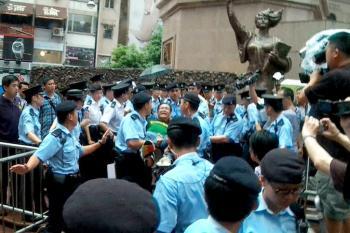
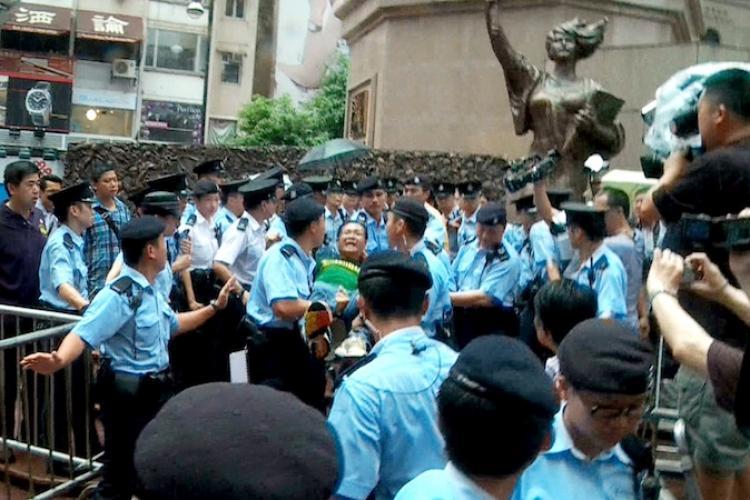
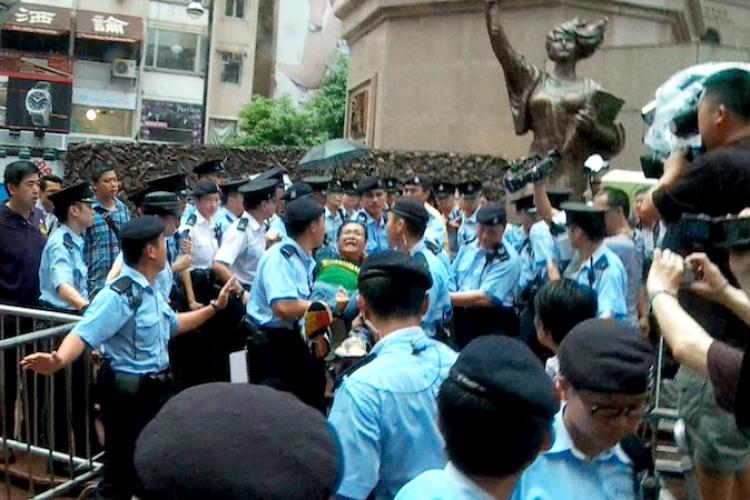
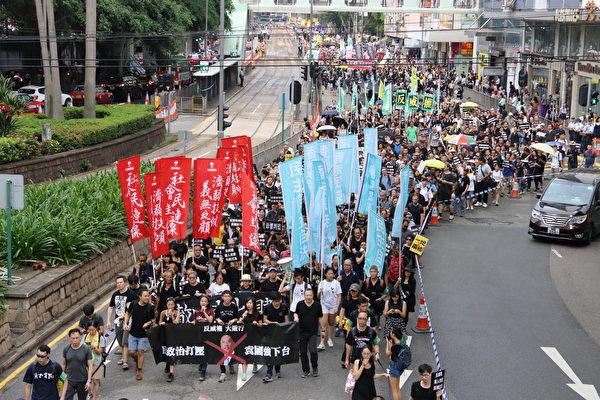
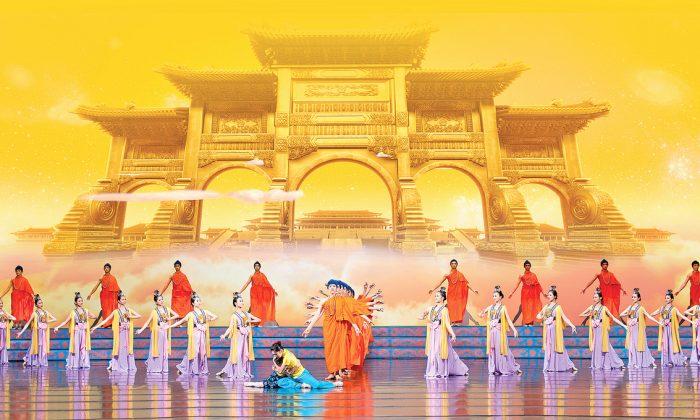
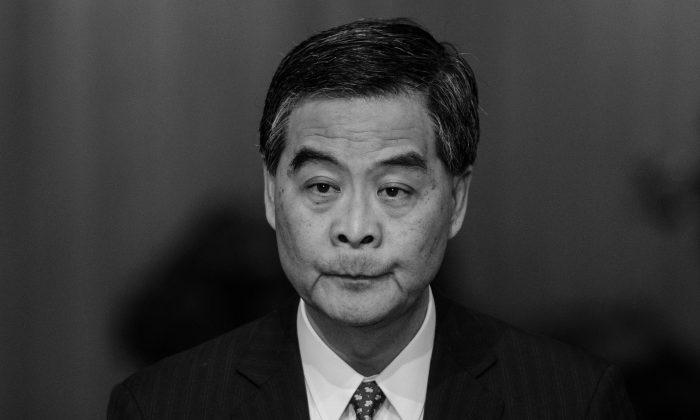
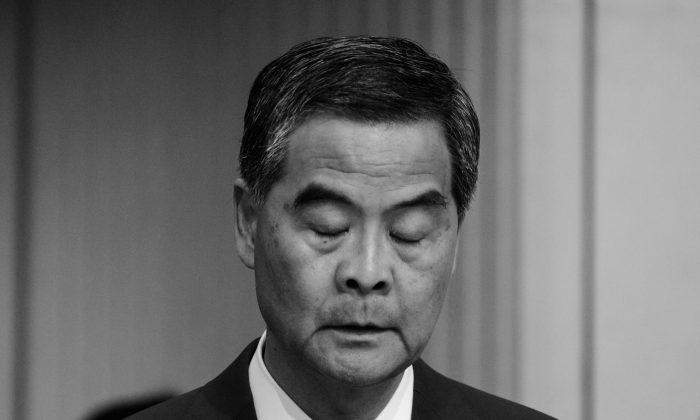
Friends Read Free